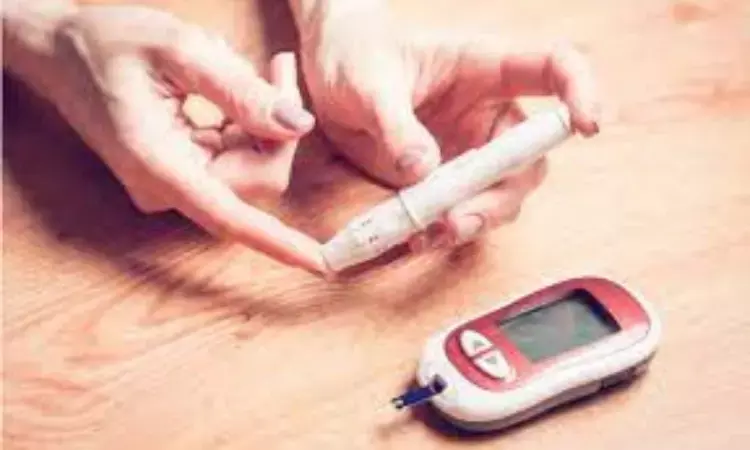- Home
- Medical news & Guidelines
- Anesthesiology
- Cardiology and CTVS
- Critical Care
- Dentistry
- Dermatology
- Diabetes and Endocrinology
- ENT
- Gastroenterology
- Medicine
- Nephrology
- Neurology
- Obstretics-Gynaecology
- Oncology
- Ophthalmology
- Orthopaedics
- Pediatrics-Neonatology
- Psychiatry
- Pulmonology
- Radiology
- Surgery
- Urology
- Laboratory Medicine
- Diet
- Nursing
- Paramedical
- Physiotherapy
- Health news
- Fact Check
- Bone Health Fact Check
- Brain Health Fact Check
- Cancer Related Fact Check
- Child Care Fact Check
- Dental and oral health fact check
- Diabetes and metabolic health fact check
- Diet and Nutrition Fact Check
- Eye and ENT Care Fact Check
- Fitness fact check
- Gut health fact check
- Heart health fact check
- Kidney health fact check
- Medical education fact check
- Men's health fact check
- Respiratory fact check
- Skin and hair care fact check
- Vaccine and Immunization fact check
- Women's health fact check
- AYUSH
- State News
- Andaman and Nicobar Islands
- Andhra Pradesh
- Arunachal Pradesh
- Assam
- Bihar
- Chandigarh
- Chattisgarh
- Dadra and Nagar Haveli
- Daman and Diu
- Delhi
- Goa
- Gujarat
- Haryana
- Himachal Pradesh
- Jammu & Kashmir
- Jharkhand
- Karnataka
- Kerala
- Ladakh
- Lakshadweep
- Madhya Pradesh
- Maharashtra
- Manipur
- Meghalaya
- Mizoram
- Nagaland
- Odisha
- Puducherry
- Punjab
- Rajasthan
- Sikkim
- Tamil Nadu
- Telangana
- Tripura
- Uttar Pradesh
- Uttrakhand
- West Bengal
- Medical Education
- Industry
Higher fasting blood sugar worsens knee symptoms in patients with knee osteoarthritis

Japan: A recent study in Arthritis Research & Therapy has shown that higher blood sugar levels in patients with radiographic knee osteoarthritis (KOA) and central sensitization (CS) are associated with worsened knee symptoms during the 1-year follow-up.
The authors suggest healthcare providers pay attention to controlling blood sugar, specifically in patients with knee osteoarthritis and concurrent central sensitization to reduce their knee symptoms.
Cross-sectional and cohort data have suggested that higher serum blood glucose levels in patients with KOA are linked with more severe knee symptoms; more is needed about the longitudinal relationship between serum blood sugar and knee symptoms, especially considering CS comorbidity, which also deteriorates knee symptoms.
Against the above background, Daisuke Chiba from Hirosaki University Graduate School of Medicine in Aomori, Japan, and colleagues aimed to assess the longitudinal relationship between fasting blood sugar (FBG) at baseline and change in knee symptoms based on central sensitization comorbidity. They hypothesized that a higher FBG level is more likely to cause a decline in knee symptoms in patients with knee osteoarthritis and comorbid CS.
The authors enrolled 297 participants (mean age: 59.6 years) in the study. At baseline, the evaluation of plain radiographs of the bilateral knee joints was done according to the Kellgren–Lawrence grade (KLG). All patients showed at least a KLG ≥ 2 in each knee. Fasting blood sugar and Central Sensitization Inventory-9 (CSI-9) were assessed at baseline; more than 10 points on the CSI-9 were defined as CS+. KOOS (Knee injury and Osteoarthritis Outcome Score) was investigated at baseline and a follow-up of 1 year; ΔKOOS (change in KOOS) was calculated by subtracting the KOOS at baseline from KOOS at the follow-up of 1 year. ΔKOOS was taken as the dependent variable, and the independent variable was FBG after adjustments for sex, age, CSI-9, and BMI at baseline.
The key findings of the study were:
· Of the 297 subjects, 16.2 % were defined as CS+. In the CS − group, no association was found between FBG levels at baseline and ΔKOOS.
· FBG at baseline was negatively linked with ΔKOOS pain (B = − 0.448), ADL (B = − 0.438), and sports (B = − 0.706).
To sum up, higher FBG levels at the baseline deteriorated knee symptoms in radiographic knee osteoarthritis and comorbid CS patients during a follow-up of 1 year. On the other hand, fasting blood sugar was not longitudinally associated with knee symptoms.
"There was a negative association between CS comorbidity and KOOS scores at baseline for patients with radiographic KOA. However, CS itself did not impact longitudinal changes in KOOS," the authors wrote. "Therefore, comorbid CS deteriorated knee symptoms in radiographic KOA patients only when their fasting blood sugar was increased."
Reference:
Chiba, D., Ohyama, T., Sasaki, E. et al. Higher fasting blood glucose worsens knee symptoms in patients with radiographic knee osteoarthritis and comorbid central sensitization: an Iwaki cohort study. Arthritis Res Ther 24, 269 (2022).
https://doi.org/10.1186/s13075-022-02951-2
Dr Kamal Kant Kohli-MBBS, DTCD- a chest specialist with more than 30 years of practice and a flair for writing clinical articles, Dr Kamal Kant Kohli joined Medical Dialogues as a Chief Editor of Medical News. Besides writing articles, as an editor, he proofreads and verifies all the medical content published on Medical Dialogues including those coming from journals, studies,medical conferences,guidelines etc. Email: drkohli@medicaldialogues.in. Contact no. 011-43720751


